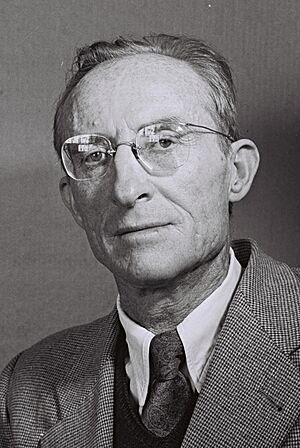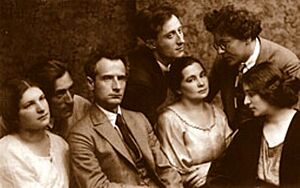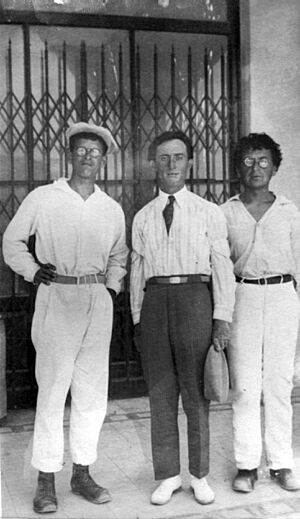Uri Zvi Greenberg facts for kids
Quick facts for kids
Uri Zvi Greenberg
|
|
|---|---|

Greenberg in 1956
|
|
| Faction represented in the Knesset | |
| 1949–1951 | Herut |
| Personal details | |
| Born | 22 September 1896 Bilyi Kamin, Austria-Hungary |
| Died | 8 May 1981 (aged 84) Ramat Gan, Israel |
Uri Zvi Greenberg (Hebrew: אוּרִי צְבִי גְּרִינְבֶּרְג; September 22, 1896 – May 8, 1981) was a famous poet, journalist, and politician from Israel. He wrote in both Yiddish and Hebrew.
Many people think he was one of the greatest poets in Israel's history. He won the important Israel Prize in 1957 and the Bialik Prize multiple times for his amazing writing. Greenberg is known for bringing a modern art style called Expressionism into Hebrew and Yiddish literature.
Contents
Uri Zvi Greenberg's Life Story
Uri Zvi Greenberg was born in 1896 in a town called Bilyi Kamin in Austria-Hungary. His family was Hasidic, which is a branch of Judaism. He grew up in Lemberg (now Lviv) and had a traditional Jewish education.
In 1915, he joined the Austrian army and fought in World War I. A difficult experience during the war, where many soldiers died, deeply affected him. He wrote about it for many years. When he returned to Lemberg, he saw terrible events called pogroms, which were attacks against Jewish people. He and his family barely escaped being harmed. This made him believe that Jewish people living in Europe were in great danger.
In 1920, Greenberg moved to Warsaw, a city with a lively Jewish culture. He wrote for new and exciting Jewish poetry magazines there. After a short time in Berlin, he moved to Mandatory Palestine (which is now Israel) in 1923. This move is called aliyah.
Greenberg spent most of the 1930s in Poland, working as an activist for a movement called Revisionist-Zionism. When World War II started in 1939, he managed to escape back to Mandatory Palestine. Sadly, his parents and sisters stayed behind and were killed during the Holocaust.
In 1950, Greenberg married Aliza. They had three daughters and two sons. He added "Tur-Malka" to his family name to honor his family members who died in the Holocaust, but he still used "Greenberg" for his public work. He lived in Ramat Gan, Israel.
Greenberg's Writing Career
When Uri Zvi Greenberg was young, other writers encouraged him. He started publishing poems in Yiddish and Hebrew when he was just 16. His first book came out while he was fighting in the war.
In Warsaw, he helped start a group of young Yiddish writers called Di Chaliastre (meaning "the gang"). He also edited a Yiddish magazine called Albatros. This magazine was very modern and artistic. However, it was banned by the Polish government, and Greenberg had to leave for Berlin in 1922 to avoid trouble. He published the last issues of Albatros in Berlin before moving to Palestine in 1923.
In Palestine, Greenberg wrote for Davar, a major newspaper. His writing combined old Jewish traditions with his own personal feelings about life. He used ideas from the Bible, the Talmud, and prayer books, but he was also inspired by European literature.
In his poems and articles, he often warned about the dangers facing Jewish people living outside of Israel. After the Holocaust, he was very sad that his warnings had come true.
Greenberg's Political Work
In 1930, Greenberg joined the Revisionist movement, which was a political group that believed in a strong Jewish state. He represented this movement at several important meetings. After a terrible event in 1929 called the 1929 Hebron massacre, he became even more determined.
With two friends, Abba Ahimeir and Yehoshua Yeivin, he started a group called Brit HaBirionim. This group secretly worked against the British rules in Palestine. For example, they protested a British census, blew a special horn called a shofar at the Western Wall even though it was forbidden, and took down Nazi flags from German offices. When the British arrested many members, the group stopped existing.
Greenberg believed that the Holocaust was a very sad but almost expected result of Jewish people not paying enough attention to their own future. He had warned about the destruction of European Jews as early as 1923.
After Israel became an independent country in 1948, he joined a political party called Herut, led by Menachem Begin. In 1949, he was elected to the first Israeli parliament, called the Knesset. He lost his seat in the next election in 1951. After the Six-Day War in 1967, he joined a group that wanted Israel to keep control of the West Bank.
Awards and Special Recognition
- In 1947, 1954, and 1977, Greenberg won the Bialik Prize for his amazing Hebrew writing.
- In 1957, he received the prestigious Israel Prize for his contributions to literature.
- In 1976, the Knesset (Israel's parliament) held a special meeting to celebrate his 80th birthday.
Uri Zvi Greenberg's Books
In Yiddish:
- Evening Gold (פאַרנאַכטנגאָלד): A collection of his early poems.
- Mefisto (מעפיסטא): A long poem about the "Faustian" world.
- In the Kingdom of the Cross (אין מלכות פֿון צלם): A long poem about his experiences during the 1918 pogroms and Christian ideas.
In Hebrew:
- A Great Terror and Moon (poetry), 1925
- The Rising Masculinity (poetry), 1926
- A Vision of One of the Legions (poetry), 1928
- Anacreon at the Pole of Sorrow (poetry), 1928
- House Dog (poetry), 1929
- A Zone of Defense and Address of the Son-of-Blood (poetry), 1929
- The Book of Indictment and Faith (poetry), 1937
- From the Ruddy and the Blue (poetry), 1950
- Streets of the River (poetry), 1951
- In the Middle of the World, In the Middle of Time (poetry), 1979
- Selected Poems (poetry), 1979
- Complete Works of Uri Zvi Greenberg, 1991
- At the Hub, 2007
See also
 In Spanish: Uri Zvi Greenberg para niños
In Spanish: Uri Zvi Greenberg para niños
- The Modern Hebrew Poem Itself
- List of Hebrew-language poets
- List of Israel Prize recipients
- Literature of Israel
 | Selma Burke |
 | Pauline Powell Burns |
 | Frederick J. Brown |
 | Robert Blackburn |



